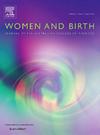‘Every woman deserves that’: A qualitative exploration of the impact of Australia’s national maternity strategy
IF 4.4
2区 医学
Q1 NURSING
引用次数: 0
Abstract
Background
Since 2019, maternity care in Australia has been guided by the national maternity policy, Woman-centred care: Strategic directions for Australian maternity services (the Strategy). The Strategy has four core values (safety, respect, choice and access), which underpin 12 principles of woman-centred care.
Aim
To describe women’s experiences of receiving maternity care in Australia and explore how their care aligned with the values and principles of the Strategy.
Methods
A qualitative descriptive approach was used. Fifty women from across Australia, including women from each of the priority populations within the Strategy, were interviewed. Data analysis was conducted using Braun and Clarke’s reflexive thematic analysis.
Findings
Women described how their care aligned and misaligned with the Strategy. Workforce shortages impacted their sense of safety, and they frequently had to self-advocate for individualised care that made them feel safe. Women wanted a holistic approach to care provision where they were listened to, heard, and their choices were respected by maternity care providers, but they felt the need to arm themselves with information to achieve this. They also expressed a desire for better care in the postnatal period to 12 months that included appropriate and affordable mental health support.
Conclusion
Receiving care that aligns with the values and principles of the Strategy is on an ad hoc basis, and maternity care provision is not consistent across Australia. A greater commitment to the implementation and adoption of the Strategy is required at a national and service level if its intent is to be fully realised.
求助全文
约1分钟内获得全文
求助全文
来源期刊

Women and Birth
NURSING-OBSTETRICS & GYNECOLOGY
CiteScore
7.20
自引率
13.20%
发文量
371
审稿时长
27 days
期刊介绍:
Women and Birth is the official journal of the Australian College of Midwives (ACM). It is a midwifery journal that publishes on all matters that affect women and birth, from pre-conceptual counselling, through pregnancy, birth, and the first six weeks postnatal. All papers accepted will draw from and contribute to the relevant contemporary research, policy and/or theoretical literature. We seek research papers, quality assurances papers (with ethical approval) discussion papers, clinical practice papers, case studies and original literature reviews.
Our women-centred focus is inclusive of the family, fetus and newborn, both well and sick, and covers both healthy and complex pregnancies and births. The journal seeks papers that take a woman-centred focus on maternity services, epidemiology, primary health care, reproductive psycho/physiology, midwifery practice, theory, research, education, management and leadership. We also seek relevant papers on maternal mental health and neonatal well-being, natural and complementary therapies, local, national and international policy, management, politics, economics and societal and cultural issues as they affect childbearing women and their families. Topics may include, where appropriate, neonatal care, child and family health, women’s health, related to pregnancy, birth and the postpartum, including lactation. Interprofessional papers relevant to midwifery are welcome. Articles are double blind peer-reviewed, primarily by experts in the field of the submitted work.
 求助内容:
求助内容: 应助结果提醒方式:
应助结果提醒方式:


